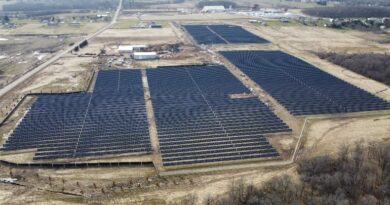PEAKER Act of 2021 calls for 10% energy storage ITC to replace dirty peaker plants
A new piece of legislation has been introduced to Congress: Promoting Energy Alternatives is Key to Emission Reductions Act of 2021, also known as the PEAKER Act of 2021.
Supported by U.S. Senator Kirsten Gillibrand and Representatives Yvette D. Clarke, Nydia Velazquez and Jerrold Nadler — all from New York — the bill would provide financial incentives to facilitate more rapid deployment of clean energy and energy storage to replace aging and dirty peaker plants in disadvantaged communities. The quartet announced the Act outside Sims Recycling Plant in Sunset Park, Brooklyn.
“Communities from Sunset Park to the South Bronx bear the brunt of harmful emissions because of peaker plants in their backyards,” said Senator Gillibrand. “To help these communities, and to help our country build a stronger, healthier and more sustainable future, we must shift our energy reliance away from fossil fuels to renewables. Our bill, the PEAKER Act, would help quickly replace aging and dirty peaker plants with clean energy and battery storage. Together, we will keep working to bring an end to the use of these fossil fuel plants, to usher in the next generation of green energy technology, and help these communities breathe cleaner air.”
“Marginalized communities have always been on the front lines of environmental battles,” said Rep. Velazquez. “People of color, working families, and women are disproportionately affected by environmental problems. I’m proud to join my House and Senate colleagues in introducing the PEAKER Act, which will address this environmental injustice by facilitating clean energy conversions and battery storage to help replace these aging and dirty peaker plants.”
New York City is home to 16 operating peaker plants. Almost all of these peaker plants are located in low-lying, industrial flood zones where low-income communities and communities of color live. According to the New York Public Service Commission, peaker plants around the city emit twice as much carbon dioxide per unit of electricity than regular power plants and 20-times as much nitrogen oxides — which are responsible for high rates of respiratory illnesses like asthma, heart disease, and cancer. In the Mott Haven and Melrose sections of the Bronx, which are surrounded by peaker plants, the asthma emergency room visit rate among children ages 5 to 17 is nearly triple the citywide rate.
“The PEAKER Act of 2021 places a long-overdue focus on environmentally overburdened BIPOC communities like the South Bronx, where four peaker power plants line our waterfront, ” said Mychal Johnson, co-founder of South Bronx Unite. “COVID-19 again exposed how air pollution causes disproportionate rates of death in communities like ours, and the time is now for a vision and transformation toward cleaner energy and better health outcomes. We appreciate the collaborative efforts and commitment of the sponsors and supporters of the PEAKER Act of 2021 in leading this effort to create change.”
The PEAKER Act of 2021 would:
- Direct the Secretary of Energy, in coordination with the Administrator of the Environmental Protection Agency, the White House Environmental Justice Advisory Council, the White House Environmental Justice Interagency Council, and Council on Environmental Quality, to perform a nation-wide assessment that identifies the location of each dirty peaker plant in the United States and determines the quantity and type of pollution each plant is producing. The assessment will also evaluate the demographic details around the location of each peaker plant to specifically determine whether the peaker plant is located within or adjacent to a disadvantaged community.
- Establish a new 10% additional Investment Tax Credit for battery storage and renewable electricity to displace electricity generated by dirty peaker plants in disadvantaged communities.
- Establish a new grant program at the Department of Energy, funded at $1 billion annually over the next 10 fiscal years, for clean energy projects that will help to reduce or eliminate the need of existing dirty peaker plants. Importantly, these projects must be implemented within, or have a direct benefit to disadvantaged communities that have been impacted by pollution from an existing dirty peaker plant. Funding will go to projects that aim to either assess clean energy strategies to reduce the need for dirty peaker plants or to projects that deploy clean energy technologies such as renewable energy resources, battery storage, energy efficiency measures, and demand-side management strategies. Entities who may apply for grant funding include: state or local governments, nonprofit organizations, community-based organizations and electric co-ops, or a partnership between any of the aforementioned entities and an electric utility or a private business. Communities who wish to first undergo a clean energy assessment and then implement clean energy strategies based on the assessment’s findings will be able to apply for two rounds of grant funding.
Senator Gillibrand (D-NY) and Congresswoman Clarke (D-NY-09) were joined in introducing the bicameral PEAKER Act of 2021by U.S. Senator Chris Van Hollen (D-MD) and Representatives Ritchie Torres (D-NY-15), Nydia Velazquez (D-NY-7), Jerrold Nadler (D-NY-10), Adriano Espaillat (D-NY-13), Mondaire Jones (D-NY-17), Nanette Diaz Barragán (D-CA-44), Eleanor Holmes Norton (D-DC), Barbara Lee (D-CA-13), Nikema Williams (D-GA-05), Darren Soto (D-FL-09), and Ro Khanna (D-CA-17).
The legislation is endorsed by 12 groups including: New York Lawyers for the Public Interest, New York City Environmental Justice Alliance, WE ACT, South Bronx Unite, UPROSE, American Council on Renewable Energy (ACORE), Sunrun, Natural Resources Defense Council (NRDC), Sierra Club, Union of Concerned Scientists, Environmental Defense Fund (EDF), National Wildlife Federation (NWF).
“We commend Senator Gillibrand and Congresswoman Clarke for introducing the PEAKER Act of 2021 and joining the chorus of legislators focused on accelerating energy storage deployment,” said U.S. Energy Storage Association Interim CEO Jason Burwen. “In addition to a tax credit for storage paired with renewable power generation that substitutes for peaker power plants, the PEAKER Act offers a grant program for emissions-free energy storage located in communities that have historically shouldered greater burdens of pollution from power generation and are on the front lines of adapting to climate change-driven extreme weather. Energy storage facilities will offer added resilience for local electric service and ensure these communities have an economic stake in the transition to clean energy.
News item from Kirsten Gillibrand
<!–
–>
Original Source: https://www.solarpowerworldonline.com/2021/05/peaker-act-of-2021-calls-for-10-energy-storage-itc-to-replace-dirty-peaker-plants/















